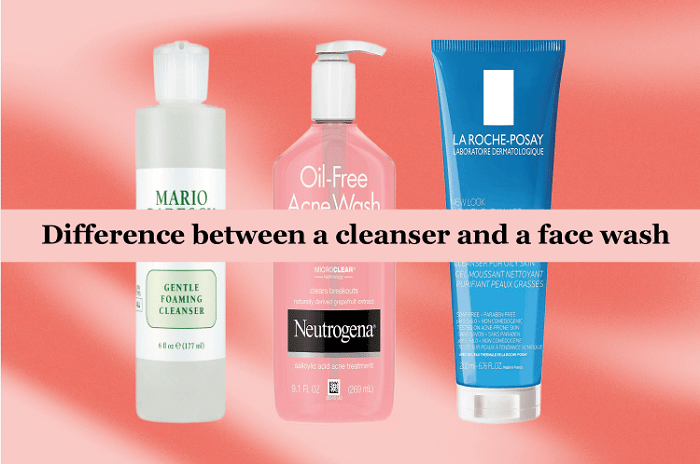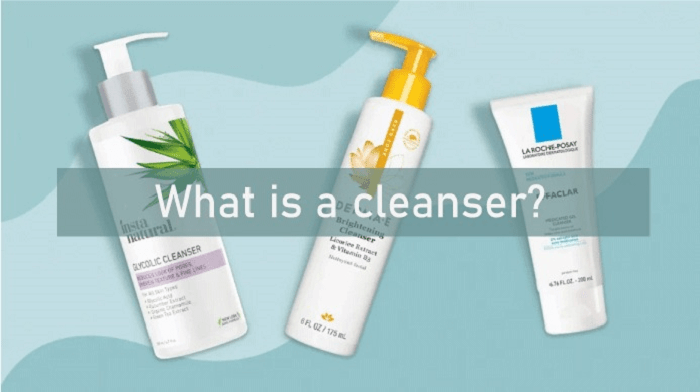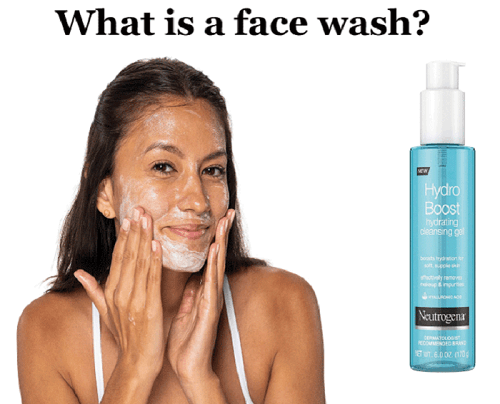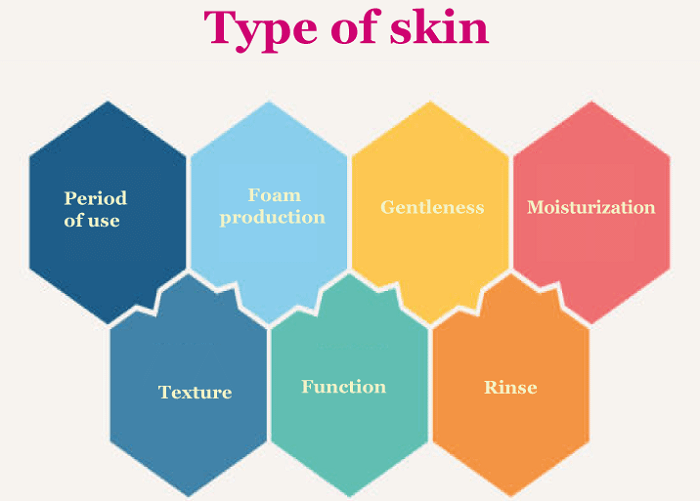Difference Between Cleanser and Face WashThe majority of us frequently confuse face wash with Cleanser. Even though both skincare products assist in washing your skin, their cleaning methods differ slightly. Confirming that your two products satisfy your skin's needs is crucial. They have detailed the differences between the two to aid you with that task. 
Choosing the ideal product for your face might take a lot of work, particularly when thousands of alternatives are available, even if you know that cleaning your face is healthful and make up a critical element of your skincare routine. But, you hear terms like Cleanser and face wash and wonder what they're truly used. A face wash and a cleanser differ from one another. If you're seeking information, it is available here for you. Here is a thorough explanation of the differences between a face wash and a cleanser. What is a Cleanser?
A cleanser is a substance used to remove dirt from the face and maintain its cleanliness. The primary function of a face cleanser is to get rid of oil, filth, and cosmetics, especially before night. It is a non-foaming product that does not need to be rinsed off when applied to our faces. What is a Face Wash?
We use a face wash without regular soap when we want to wash our faces. Businesses have created a wide range of substances to offer a more up-to-date substitute for soap for washing our skin, especially our faces. Facial washes are foaming liquids that remove dirt and grime accumulated over time and energize consumers. Difference Between Cleanser and Face Wash
People frequently wonder if cleanser and face wash are the same things. No, it is not. They both differ based on many elements. Using the following table, you can recognize a cleanser from a face wash.
1. Type of SkinFor dry, sensitive skin, cleansers are best suggested. They hydrate the skin, keeping it less sensitive to environmental factors. Cleansers should be used to safeguard the skin of those who use cosmetics and are exposed to pollution. The difference between both a face wash and a cleanser is significant. The face wash is offered when someone has oily skin and needs thorough cleaning to eliminate substances from the skin and start opening breathing pores. The face wash is particularly beneficial for oily skin since it starts to break down and dissolves dirt, grime, and oil that cleansers cannot clear. 2. Period of UseCleansers would be best to clean your face before sleeping at night. You must remove all makeup and other substances before bed after a day in an atmosphere where dust and other toxic objects stay on your face. It cleans and refreshes your face. Individuals are often advised to wash their faces in the morning with the help of face wash as they prepare for the day or work. 3. Foam ProductionFacial cleansers do not create foam and hence do not give a refreshing or moisturizing experience. Their major objective is to remove oil and ingrained dirt. Cleansers and face washes must be used in moderate quantities, and there is a difference between the two. Face wash creates foam using it, which is crucial to preserving the skin's cleanliness, hydration, and renewal. It indicates the two products may be used because it shares characteristics with conventional bathing soap. 4. GentlenessIn contrast, a cleanser is gentler than a face wash and regular soap components. Cleansers specialize in cleansing by removing all foreign substances and oils from the user's face. Many people choose to use face wash to remove the dust from their faces since it is thought to be smoother than regular bathing soap. 5. MoisturizationIn addition to successfully removing dirt, a cleanser removes extra oils, making it more moisturizing and nourishing. The amounts of moisturization in these two goods differ as well. Face washes only nourish and moisturize the skin a little because their primary purpose is to remove dirt and debris from the face and clean the pores. 6. TextureYour skin has to be cleaned, moisturized, and soothed for a face cleanser to perform. Due to the presence of cream, oil, lotion, or powder, it will have a creamy or milky feel. Differentiating a face wash from a cleanser depends on the texture. The purpose of an alcohol-free face wash is to clean your pores completely. When applied to moist skin, the texture commonly has a gel-like or foamy consistency and lathers into foam. 7. FunctionFace cleanser removes and drains away dirt and residual makeup. It helps to remove extra oils from the skin's surface. Face wash makes the user fresh and cool; it cleans pores and helps remove the skin's deeper layers. 8. RinseFace cleanser does not necessarily rinse, but face wash needs to rinse. Advantages CleanserThis delicate skincare product cleans the skin's surface of debris, filth, oil, and sometimes makeup. Cleansers come in various varieties designed to treat various skin issues and types. Most cleansers are skin-friendly and even safe for use on sensitive skin. 1. Eliminates Dirt Easily and Effectively Our face is exposed to several daily pollutants, which attach to the skin's surface and give it a dull appearance. These dirt particles are not water-soluble and cannot be eliminated by just water. Cleansers are a great way to remedy this problem. They aid in removing dirt and dust, leaving your skin clean and glowing. 2. Prevents Acne Acne, blackheads, and whiteheads can develop when the pores get too clogged with debris, oil, and germs. Before they can penetrate the skin pores, cleansers remove impurities from the skin that cause acne. 3. Provides Hydration Proteins like collagen and elastin, essential to your skin's well-being and smoothness, need moisture to function. Cleansers assist in maintaining your skin's natural moisture to keep it feeling smooth and flexible. Advantages Face WashA face wash removes grime, dead skin cells, oil, and dirt from the pores. They produce a lot of foam and could include more astringent ingredients. Face washes also offer the following advantages. 1. Gets Rid of Dead Skin Cells A face wash also has the unique capacity to eliminate dead skin cells in addition to oil and grime. It decreases the likelihood of acne and speeds up cell renewal, giving skin a younger appearance. 2. Skin Preparation In a sense, face wash prepares your skin for the balance of your skin care regimen. Your pores become clearer and more open, which improves the consumption of other skin care products. 3. Improvement of Blood Circulation Massage is the ideal method for applying face cleanser to the skin. Your face receives greater blood flow, which results in a more glowing complexion. How are cleansers used?Although a cleanser can be utilized by itself, it is usually used before a face wash. Follow the instructions below for a better effect
How Use Face Wash?Use a facewash while following these instructions
When Utilize These Products?CleanserAs they are gentle, cleansers may be used frequently daily without harming the skin. After waking up each day and just before bed, you can use a cleanser twice.
Face WashFace washes include rather powerful ingredients that, in contrast to cleansers, can dry up your skin if used regularly. Thus, it is advised to limit their use. Cleansing your face.
Components to Stay Away From In Cleansers or Face Wash.1. Sulfates Sulfates are salts created when sulphuric acid combines with some other chemical. The sulfates SLS (sodium lauryl sulfate) and SLS are frequently found in cleansers and face washes. They are created using petroleum and plant materials, including coconut and palm oil. Sulfates can harm your skin and eyes while producing foam or bubbles. It is advised to keep clear of foamy face cleansers if you have very sensitive or dry skin. 2. Parabens Cleansers and face washes employ parabens as preservation to keep them sterile and fresh. The chemical families of methyl, butyl, and propyl include parabens. Parabens can cause breast cancer because they affect hormones. 3. Phthalates Phthalates are linked to developmental and procreative toxins. They interfere with the central nervous system. 4. Fragrance Since fragrance contains so many ingredients, it may cause skin allergies. Consider goods that include fragrant oils or plant extracts if you enjoy fragranced items. ConclusionFacial washes and cleansers remove extra oil, grime, and other pollutants from your skin, but their significant benefits differ based on your skin's demands. You may have youthful, beautiful skin if you use a few straightforward skincare suggestions. You now understand the difference between a cleanser and a face wash.
Next TopicDifference between
|
 For Videos Join Our Youtube Channel: Join Now
For Videos Join Our Youtube Channel: Join Now
Feedback
- Send your Feedback to [email protected]
Help Others, Please Share









